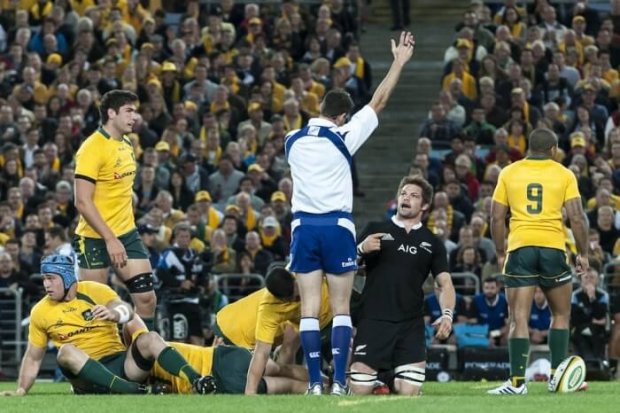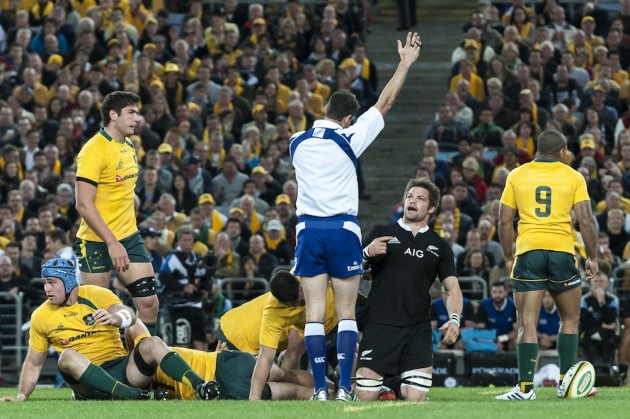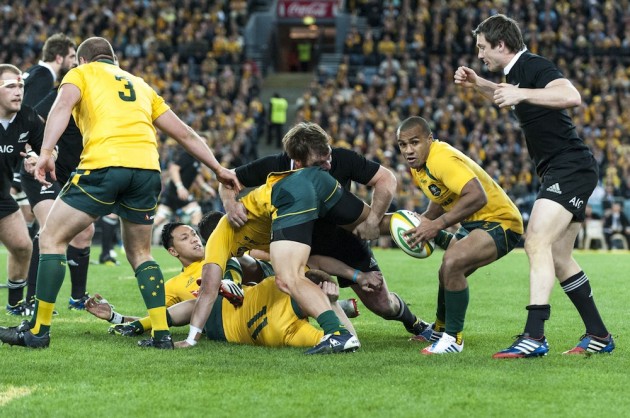During the week, Ewen McKenzie and James Horwill fed some choice words to the journos in a clear attempt to attract attention to what they saw as a deliberate All Black tactic.
Awesome photos courtesy of Tim Anger
‘As soon as we got in their half, it was a penalty,” complained McKenzie. “We didn’t spend a lot of time playing much rugby. It was a penalty, bang, yeah we kicked it and we got three points for it, but we were never able to play much. You’d like to get a bit more momentum, but we didn’t get that.” Horwill towed the party line too. “They [the penalties] were for the same thing in the same spot, so I was just letting him [referee Craig Joubert] know that they were building up and that there was a bit of a pattern to it,’ Horwill said.
The conclusion was laid bare for the press, the refs, and rugby public by McKenzie. ‘If they give away penalties, then yellow cards come in because it becomes repeated infringements. It’s one of those issues. It’s been there all year. So it’s up to the referees about when they make those decisions.’ This article looks at two related questions.
First, do Horwill and McKenzie have a point? And second, if they do, what should the Wallabies do about the ruck is being refereed?
The Wallaby Case
In the first half, the Wallabies had roughly as much of the initiative and possession as the All Blacks. They had slightly more phases and rucks, but less of the overall possession (44 per cent to 56 per cent) and territory (40 per cent to 60 per cent). Moreover, Australia was generally dominant for the central part of the half, when the score went from 0-7 to 12-10.
What we see is clear run of penalties:
- Richie McCaw slowing down the ball at 10:50
- Sam Whitelock not rolling away at 20:44
- McCaw entering from the side at 26:07
- McCaw (and Whitelock) holding onto the ball in the ruck and not bearing their own weight at 45:34
There is a pattern, but as you can see the penalties are
a) interspersed, not back to back;
b) for different specific offences, though theyr’e all ruck related; and
c) certainly for the third penalty at least, a strong case could be made that this was a “contest error” not a deliberate slowing down of the Wallaby play.
I might even add d) the ruck penalties come on the back of Julian Savea being in front of the kicker and Kieran Read taking out Rob Simmons in the air. Paradoxically, the extra non-ruck penalties dilute the impression of a string of specifically ruck penalties.
The first penalty is particularly bad. If we look carefully at the clip (and the replay) we see McCaw enter the ruck, stand up, showing real strength. But he then falls over the ball, and then kicks out at it with his leg: two offences, the second little short of blatant. The second penalty reflects this pattern: Wallabies on the advance and Whitelock just doesn’t roll away. And the fourth, well, I was yelling at the tv by then.
Disclaimer: Craig Joubert is a mate of mine. But the fourth penalty above – a third against McCaw, all in his own half, all with the Aussies on the attack – has to be a yellow card. The score was 19-25 at the time.
What to do?
When captain and coach leave the microphones behind, they should be having a good think about what Saturday can tell them about how rucks are being refereed more generally. Particularly when it comes to the ruck area, there is an ongoing dialectic between coaches and referees.
The laws of rugby themselves (scrums aside) change infrequently, but interpretations and emphases change often. Referees push coaches in one direction, coaches try to adapt and exploit the existing interpretations, and the process goes on.
What’s been happening this year is that referees have been very lax on the defensive side at rucks as a general principle. The Brumbies grounded much of their title challenge on making opposition rucks a mess, by hook or by crook, in a way you just wouldn’t have seen a year or two ago. In other words, what happened on Saturday was entirely consistent with the broader trend, not an outlier, and can be expected next week and the week after.
Talking to the media is one (decent) way of dealing with this phenomenon. But adapting to the prevailing emphases is surely a more effective route.
First, the Wallabies need to work on their ruck accuracy: not just getting to the rucks, but actually taking out opposing forwards. The flipside of this is not entering lost rucks. There was plenty of pointless over-committing on Saturday, which robs the line of one more defender which, as two of the first half tries showed, is all the All Blacks need.
Second, the Wallabies need to exploit some of the leeway that’s currently available to the defensive side. The line speed needs to create pressure, even at the risk of the occasional offside. The Wallabies should be slightly less eager to roll away, if they can execute the strategy smartly. Even a roll away into an oncoming forward forces them to alter their body height and gives the arriving forwards on your team a split second’s advantage.
I’d also like to see a little less respect paid to the zone around Aaron Smith. We saw how devastatingly Ben Mowen could make a halfback’s life hell in the latter stages of Super Rugby and during the Lions. I’d like to see more of this.
Finally, I’d like to see us get the ball out of the ruck quicker, both to reduce the likelihood of counterrucks and to put pressure on the All Blacks to get back into the defensive line, rather than get into the ruck in the first place. Slow ball, especially by choice, as you line up the next runner, is a terrible compromise. Every second you allow your attackers to get ready for the next contact, you also give to the opposition defensive line. It should be avoided, plain and simple. A fast paced game is the way to go.
Most of all, I’d hate to see the Wallabies respond to their struggles at the breakdown by kicking the ball away, the Brumbies’ strategy. If you re-watch the first half (and God knows it was sometimes painful to do so), there is a lot of good stuff there. The problem is that the new team just aren’t quite on the same page yet; from one turnover even the simple hands looked stilted; another early lineout was very formulaic.
That won’t last long. O’Connor will remember how to defend on the wing. The Wallaby No. 6 is unlikely to be as anonymous as the guy Jesse Mogg passed it to. And it’s not every day you have a five-eighth and fullback making their run-on debuts and both having struggles with the boot. Plus the Aussies did a lot of good things. Damien Hill has already highlighted the lineout. With one exception, the Wallabies as a team dealt very well with the high-ball. And there was a lot to like about the big hits early on.
I do subscribe to the point of view that the Wallabies are a good deal better than Saturday suggested and hopefully we’ll see a more combative, more savvy approach at the rucks to bear this out this week.




